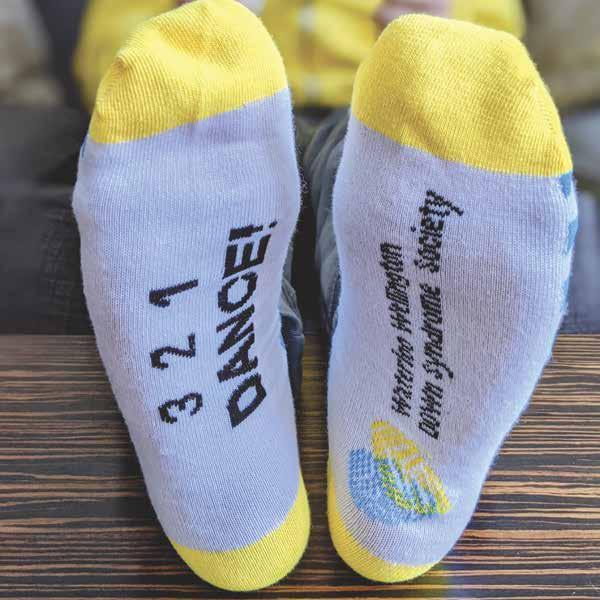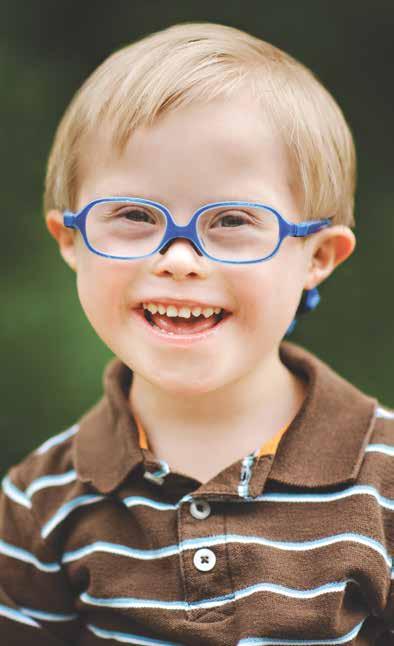
6 minute read
racism on appearance and body image 13. Celebrating those with Down syndrome and reducing stigma
from The Ontarion - 190.3
by The Ontarion
Celebrating those with Down synDrome anD reDuCing stigma
World Down Syndrome Day offers locals a chance to connect, raise awareness, and consider unique COVID-19 challenges
TAYLOR PACE
Locals look forward to World Down Syndrome Day this March as a time to celebrate those with Down syndrome, raise awareness, and dismantle stigmas about this intellectual disability.
World Down Syndrome Day (WDSD) has been observed by the United Nations since 2012. It’s held on March 21 because it is the 21st day of the third month, which “[signifies] the uniqueness of the triplication (trisomy) of the 21st chromosome which causes Down syndrome,” according to Down Syndrome International.
Down syndrome is a naturally occurring chromosomal arrangement caused by the presence of all or part of a third copy of chromosome 21. While there are three different types, the most common is Trisomy 21, which affects 95 per cent of the Down syndrome population, and is caused by every cell in the body having three separate copies of the chromosome.
In Canada, approximately 1 in every 781 births results in a baby with Down syndrome, making it one of the most common

For World Down Syndrome Day, the Waterloo Wellington Down Syndrome Society encouraged people to purchase special edition socks and post videos of themselves dancing in them to raise awareness. CREDIT: WATERLOO WELLINGTON DOWN SYNDROME SOCIETY


developmental disabilities.
To celebrate this year, local charity and advocacy group Waterloo Wellington Down Syndrome Society (WWDSS) is planning on releasing a song written by members of their community with the help of Juno-nominated artist Alysha Brilla.
“Usually, we have a big party with over 200 people, and obviously, this year we can’t do that,” WWDSS co-chair Mary Casagrande told The Ontarion.
The theme of the song is “rock your socks,” so the members involved in the brainstorming session, from two-year-olds to thirty-year-olds, were asked to share what ideas the phrase brought to mind.
“We’re looking forward to sharing it with everyone on social media. We also produced branded Waterloo Wellington Down Syndrome Society socks, and for 21 days leading up to World Down Syndrome Day, we’re going to tell people to buy these socks and wear them and dance in them and share your video on social media,” she said.
Socks have been a long-standing prop for WDSD because they look like chromosomes. Often, the socks are mismatched to represent the mismatched chromosomes people with Down syndrome can have.
WWDSS member and Guelph resident Katrina Fraser participated in the song writing event along with her 5-year-old son Seamus who has Down syndrome. Fraser believes the day is an opportunity to raise awareness, while also providing “camaraderie and friendship” among the Down syndrome community.
This past fall, the WWDSS changed their name from Waterloo Regional DSS to Waterloo Wellington DSS to better serve the people within the Guelph-Wellington area.
Now, the group has just over 100 members, with about 10 per cent of them in the Guelph-Wellington area.
When Fraser received Seamus’s prenatal diagnosis, she was directed to someone in Milton, despite living closer to Water-
— Katrina Fraser
For World Down Syndrome Day on March 21, five-year-old Seamus and his mom, Katrina Fraser, participated in the song writing workshop with Alysha Brilla. The song, which was written in collaboration with Waterloo Wellington Down Syndrome Society members, will be released on March 21 in celebration of the day. CREDIT: KATRINA FRASER


loo Region. Before the WWDSS expanded to include Guelph, she relied on “a core group of families that knew each other, and had an informal Down syndrome group.”
However, Fraser’s background has given her an advantage when it comes to raising Seamus. With an education in developmental psychology, and 12 years of experience teaching English as a second language at the U of G, she feels well-equipped to teach Seamus.
“There are a lot of times that I feel I was meant to be his mom,” Fraser said.
Seamus was born with a hole in his heart, and had open heart surgery at just under five months old. Today, he is a happy and healthy five-year-old, excelling in Junior Kindergarten and learning skills even adults would be envious of, from riding in a tow-behind trailer when his mom mountain bikes to learning to cross country ski to learning sign language.
“A lot of times you get behavioural issues with kids with Down syndrome because communication is difficult,” she said. “We knew that, and so the only TV we let him watch for the first year or two of his life was the sign language videos, so he knew [sign language] before kindergarten.”
“I think a lot of people have this perspective that kids with Down Syndrome aren’t very smart, but [Seamus] is performing better than some of his classmates,” she said.
A big contributor to this misconception is the learning techniques used in schools.
Fraser explained that individuals with Down syndrome lack executive functioning capabilities, which means they struggle with memory, flexible thinking, and self-control. So, for example, she noted that it’s harder for kids with Down syndrome “to plan their answer to a question.”
Another example would be a child who has trouble with not hitting a cat. “He knows he shouldn’t, but that stopping mechanism that helps him control his impulse is a little bit harder for him to control, so he can’t do it, and then another parent might think of him as a bad kid,” she said.
Fraser says parents and the educational system could support those with Down syndrome better by acknowledging these differences and allowing them, for example, more time to answer questions.
These days though, much of her concern is directed to the pandemic.
“Do we know what COVID would do to a repaired heart? No, so because of that, he has this underlying heart condition, which makes me, as his mom, terrified that if he gets it, it could destroy his heart,” she said.
Canadians with Down syndrome have been disproportionately affected by the pandemic because many, though not all, have underlying health conditions that could make the virus more severe if they catch it.
In fact, Casagrande noted that individuals with Down syndrome are 10 times more at risk than the general population. Despite the increased risks they face, they are not on Canada’s federal vaccination guidelines.
Interim Executive Director of the Canadian Down Syndrome Society (CDSS), Laura LaChance, told The Ontarion that many countries like the U.S., the U.K., Sweden, and Germany have all included people with Down syndrome on the priority list for vaccinations.
The CDSS has been vigilantly advocating for the guidelines to include people within high risk populations in priority groupings for the vaccine allocation.
LaChance said they have received assurances from the federal government and national advisory committee on immunization, and hope to expect the news of revision any day now.











